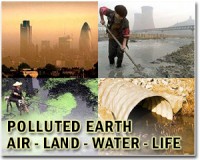 |
Venice, Louisiana (AFP) May 7, 2010 The Gulf of Mexico oil slick threatens disaster for the fragile US coast, causing clean-up efforts to focus on the best of a bad set of options: fight it there before it arrives here. An army of workers hired by British Petroleum, along with the US Coast Guard and local officials in Louisiana, have rushed to set out protective booms, spread dispersants and burn the oil when they can as it moves toward the shore. The strategy is to deal with the growing slick as much as possible before it laps into wetlands on Louisiana's coast, where its effects could be catastrophic and cleaning it is infinitely more difficult -- if not impossible. "That's the goal," said Doug Helton, a coordinator of the oil spill response for US oceans and weather agency NOAA. "The tradeoff is that the shoreline habitats are much more sensitive to oiling than the offshore areas." Scott Pegau, research program manager at the Oil Spill Recovery Institute in Alaska, created after the 1989 Exxon Valdez spill, called wetlands "the most difficult environment to have to clean." But no matter how successful the offshore efforts are, it seems inevitable that the wetlands will be hit. The question remains how hard and what the long-term effects will be. "They're not going to get it all," said Ed Overton, professor emeritus at Louisiana State University's environmental sciences department. "It is potentially a gigantic threat." Louisiana's wetlands play a vital role along the coast -- economically, culturally and scientifically. They are important spawning grounds for shrimp, oysters and a wide variety of other species sought by fishermen who form a huge chunk of the region's economy and provide a major portion of the nation's seafood. Marshlands also serve as habitat for rare birds, including the Louisiana state bird, the brown pelican. But they are important for other, lesser known reasons, as well. Wetlands, already imperiled due to erosion caused by a variety of factors, act as speedbumps for hurricanes and the water surge they push toward shore. All that taken together gives credence to the argument put forward by Louisiana Governor Bobby Jindal: The oil leak threatens an entire way of life. If or when the oil reaches the wetlands, the best option may simply be to allow it to break down naturally instead of trying cleaning methods that may destroy the marsh, some analysts say. Burning or flooding the wetlands may do more harm than good, they say, since microbes may be able to break down the oil on their own over time. "If you do something that actually destroys the wetland, then that lasts forever," said Richard Ambrose, director of the environmental science and engineering program at the University of California-Los Angeles. The effect will of course depend on the amount of oil that enters the wetlands, but Ambrose said the biggest threat to those who make a living off the water may be long-term. Fishing may be possible again within a matter of months, he said, but there will likely be less fish out there. The oil will likely kill off a large percentage of young fish since they are most vulnerable, said Ambrose. "There won't be as much shrimp or fish for the fishermen to catch," he said. "Over the long term, that could be their biggest hit." Oysters, however, are another matter. Because they feed by filtering the water, they may not be available for harvesting for a longer period of time, said Ambrose. In the meantime, cleaning efforts have benefited from favorable weather conditions in recent days, with wind and tides preventing fast movement toward the coastline. But there is deep anxiety along the Gulf Coast that a major catastrophe is imminent. "We just don't know," said professor Overton. "Dispersing it offshore is the lesser of two evils."
Share This Article With Planet Earth
Related Links Our Polluted World and Cleaning It Up
 Louisiana wildlife park closed for oil cleanup
Louisiana wildlife park closed for oil cleanupVenice, Louisiana (AFP) May 7, 2010 US officials Friday closed a wildlife refuge spread across islands off the Louisiana coast to help staff trying to clean up an oil spill washing up on the park's shorelines. "The US Fish and Wildlife Service has closed the Breton National Wildlife Refuge to public entry," US officials said in a statement, adding the first oil had been spotted on the park's shores late Wednesday. "The ref ... read more |
|
| The content herein, unless otherwise known to be public domain, are Copyright 1995-2010 - SpaceDaily. AFP and UPI Wire Stories are copyright Agence France-Presse and United Press International. ESA Portal Reports are copyright European Space Agency. All NASA sourced material is public domain. Additional copyrights may apply in whole or part to other bona fide parties. Advertising does not imply endorsement,agreement or approval of any opinions, statements or information provided by SpaceDaily on any Web page published or hosted by SpaceDaily. Privacy Statement |